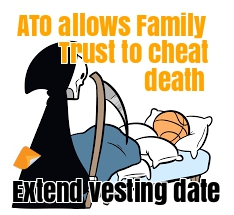How to Extend the Vesting Date of a Family Trust in Australia
Some States do not like your trust to do forever. (Legal Consolidated SMSFs Deeds and Variations, since 1988, have always been able to go forever.)
Some states inflict the trust’s death on the 80th anniversary of the trust. However, Queensland Legal Consolidated trusts go for 125 years. In South Australia, Legal Consolidated trusts go forever.
This is due to an ancient English law known as the Rule in Shelley’s Case, also referred to as the Rule against Perpetuities. These state governments do not want your trust to end up where no one is looking after the assets in the trust.
Can Family Trusts live forever?
Yes, in South Australia, these Legal Consolidated trusts last forever:
- 3-Generation Testamentary Trusts Wills
- containing a Divorce Protection Trust and Bankruptcy Trust
- Unit Trusts
- Family Trusts
- Family Trust updates
- Bare trust before you buy
- Bare trust after you buy
Legal Consolidated Trust Deeds are future-proof
What happens if the government changes the law on trust vesting dates? Nothing. We’ve already taken care of it.
If a state government ever scraps the 80-year or 125-year limit, the life of your Legal Consolidated trust automatically extends. You get the maximum time allowed under the new law.
There is no need for an update. You do not pay us any more money. It is automatic.
Is your trust a ticking time bomb?
Most trust deeds are rigid. They lock you into a fixed end date, usually 80 or 125 years. Many South Australian trusts have this time bomb!
When that day arrives, the trust must end. All assets have to be paid out to the beneficiaries, whether it’s a good time or not.
The result? A messy and expensive clean-up. This forced sale often triggers huge, unnecessary bills for Capital Gains Tax (CGT) and stamp duty.
South Australian Family Trusts often must end after 80 or 125 years
Legal Consolidated South Australian Family Trusts do not vest. However, some websites are producing Family Trust deeds and give the impression that they are law firms. These non-law firm websites often force all trusts (including Family Trusts in South Australia and Queensland) to end after 80 years.
Therefore, it is not true that all South Australian trusts go forever. Read the trust deed to find the truth.
Can I extend the end date of my family trust?
To extend the vesting date of a family trust, review the trust deed first. The deed may contain provisions allowing the trustee to extend the vesting date. If such provisions exist, the trustee can follow the outlined procedures to formally extend the date.
What if my Family Trust does not allow an extension?
If the trust deed does not allow for an extension, or if extending the vesting date would contravene state or territory laws, seek legal advice. In some cases, it may be possible to apply to a court for an order to vary the trust deed; however, this is an expensive and complex process. It is dependent on the specific circumstances and legislation of the Family Trust’s jurisdiction.
Can I change the jurisdiction of the Family Trust and then extend the vesting date?
Potentially, but you should consult with your lawyer. Changing the jurisdiction may not help.
For those states with the Rule against Perpetuities, those trusts must end – but the laws may change
Therefore, in most States, after 80 or 125 years, your trust must ‘vest’. The trust must end. (Legal Consolidated South Australian trusts are exempt from the law against perpetuities.) See, for example, the Perpetuities Act 1984 (NSW).
If the law ever changes then our trusts automatically adjust for the longest period allowed:
- 3-Generation Testamentary Trusts (but the 80 years only starts at your death)
- Superannuation Proceeds Trusts (this reduces the 32% payable on your super at death)
- Superannuation Testamentary Trusts (stops 32% tax at death)
- Unit Trust
- Family Trust
- Bare Trusts
- Acknowledgement of Trust Deed – ‘AFTER the Trustee buys’
- Declaration of Trust BEFORE you buy – ‘secretly buy’
The vesting date is the date defined in the trust deed. This is the date when the trust comes to an end. The trustee winds up the trust on the vesting date. This is achieved by distributing all of the trust assets to the beneficiaries. Whether the trustee does this or not, the trust still ‘vests’. It comes to an end.
Legal Consolidated Self-managed superannuation funds have no perpetuity period. SMSF can live forever
An SMSF is a trust. So you would expect it to die after 80 or 125 years. However, the Legal Consolidated SMSF deed is drafted as a statutory trust and goes forever. While it continues to have living members, it keeps on going – forever. Your Legal Consolidated SMSF can be handed down from generation to generation. The SMSF trust deed does need regular updates.
Does South Australia have a forced ending date for a Family Trust?
Legal Consolidated Family Trust Deeds and updates contain provisions that eliminate the requirement for an ending date. Therefore, if a state or territory has no requirement for a vesting date, the vesting date is not enforceable. For example, in South Australia, the vesting rule does not apply. Therefore, the Legal Consolidated Family Trust deed and updates can go forever in that state. However, in other Australian states, the rule remains in effect, although sometimes in a modified form. If the state or territory no longer requires a vesting date, then the Legal Consolidated Family Trust deed and Updates automatically remove the vesting date requirement.
So, for example, if the massive Westfield Shopping Centre trust structures can put pressure on the Labor and Liberal Party to remove the vesting dates for trusts in NSW and Victoria, then Legal Consolidated Family Trust and Trust updates automatically remove the forced 80-year or 125-year vesting date.
Why cannot trusts last forever? Blame the Crusades.
In the Middle Ages, knights and lords would go off to fight in the Crusades for years. Many never came back.
This created a huge legal mess. Who owned their land? Was it their son? A distant cousin mentioned in a letter? Land became locked up, unable to be used, sold, or taxed for generations.
The Government hated this.
An economy cannot function if no one knows who owns what. The King couldn’t get his taxes.
Therefore, the law intervened and established the ‘rule against perpetuities’. It’s a simple idea: a trust must have a deadline. It cannot tie up assets forever. At some point, the property must be handed over to a living, breathing owner who can use it and pay tax on it.
Legislation and common law to stop Australian trusts from going on forever
The common law rule against perpetuities has been abolished in South Australia (section 61, Law of Property Act 1936 (SA), and modified by legislation in the other States and Territories.
- New South Wales: section 8 Perpetuities Act 1984 (NSW)
- Victoria: section 6 Perpetuities and Accumulations Act (Vic)
- Queensland: section 210, Property Law Act 1974 (Qld)
- South Australia: abolished, section 61, Law of Property Act 1936 (SA)
- Western Australia: section 103, Property Law Act 1969 (WA)
- Tasmania: section 9, Perpetuities and Accumulations Act 1992 (Tas)
- Northern Territory: section 190, Law of Property Act 2000 (NT)
- Australian Capital Territory: section 9, Perpetuities and Accumulations Act 1985 (ACT)
What happens to a trust when it vests and ends?
This means all the assets are deemed to have come out of your trust. This triggers:

- Capital Gains Tax
- Transfer (Stamp) Duty
- ownership issues
- asset protection
- loss of licenses
- land tax
- family law disputes
Before the start of CGT in 1985, many trusts often had a vesting date of less than 80 years. A vesting date of 21 years was not uncommon. Until recently, the ATO took the view that you could not amend your trust deed to extend the vesting date to the maximum of 80 years.
The ATO has changed its mind – you can now postpone the vesting date
Taxation Ruling TR 2018/6, issued on 15 August 2018, finalises the Commissioner’s views on the income tax consequences of a trust vesting. These views are the same as those contained in the old draft (TR 2017/D10), although, in Legal Consolidated’s view. the final ruling includes some fine-tuning.
A trust’s “vesting” or “termination” date is the day on which the beneficiaries’ interests in the property of the trust become “vested in interest and possession”. The trust deed should specify the vesting date and the consequences of that date being reached (eg that the trust property will be held from that date for the takers on vesting in equal shares absolutely). The ATO notes that vesting does not, of itself, ordinarily, cause the trust to come to an end or cause a new trust to arise. If the trustee continues to hold property for the takers on vesting, the property will be held on the same trust (although the nature of the trust relationship will change).
The ATO now believes that if you have a trust with a vesting date of less than 80 years then:
- provided you do it before the vesting date, you may extend the vesting date. But the maximum period is still 80 years (except in South Australia).
- if the vesting date has passed, you are too late. The trust has already been vested. The trust has ended. Extending the trust is no longer possible. Even all the beneficiaries coming together cannot change this.
- you need a Deed of Variation (or a Court order) to extend the vesting date to 80 years. This can’t be implied. The vesting date cannot be extended by implication – such as the trustee and beneficiaries acting in a certain way.
The ATO can change its mind again. Update the vesting date while you still legally can.
TR 2018/16 – ATO allows trust vesting dates to be extended:
- before vesting, it may be possible to extend the vesting date (by applying to a court or by the trustee exercising the power to nominate a new vesting date) as set out in the Australian Tax Office Ruling 2018/16. A proposed alteration by a trustee without court intervention is subject to any specific requirements in the trust deed about how and when any alteration to the vesting date can occur;
- it is too late to change the vesting date once it has passed and the ATO says it is unlikely that a court would agree to do so due to the interests in the trust property becoming fixed at law; and
- continuing to administer the trust in a way that is inconsistent with the vesting terms can have significant tax consequences (eg potentially CGT event E1).

CGT when you end your trust
TR 2018/6 considers whether various CGT events may occur on vesting or post-vesting, noting that the terms of the trust deed are particularly relevant. The ATO says that:
CGT event E1
(creation of a new trust) “need not happen merely because a trust has vested”. This is because vesting does not, of itself, ordinarily, cause a trust to come to an end and its property to settle on the terms of a new trust. However, CGT event E1 may occur if the parties to a trust relationship subsequently act in a manner that results in a new trust being created by declaration or settlement;
CGT event E5
(beneficiary becoming entitled) may occur if the takers on vesting become entitled as against the trustee to CGT assets of the trust; and
CGT event E7
(disposal to a beneficiary to end a capital interest) may happen on actual distribution of CGT assets to beneficiaries, but will not occur to the extent that the beneficiaries are already absolutely entitled to the CGT assets as against the trustee.
Taxation of trust net income after the vesting date
The ruling notes that, in the income year of vesting, different beneficiaries may be presently entitled to trust income derived before and after the vesting date. For example, the trustee of a discretionary trust may, before vesting, exercise discretion to appoint pre-vesting income among those entitled to benefit under the trust. By contrast, the takers on vesting are presently entitled to post-vesting income (usually in proportion to their vested interests in the trust property). In this situation, the ATO may accept a “fair and reasonable” allocation of trust income into pre- and post-vesting trust income.
TR 2018/6 also provides that for trust vesting:
-
- in the income years after vesting, all of the trust income flows to the takers on vesting according to their entitlements, so the trustee will not be assessed on any net income; and
- a post-vesting payment or other purported distribution by the trustee is in breach of trust and void if it is inconsistent with the vested beneficiaries’ fixed interests, and the deemed present entitlement rules in sections 101 and 95A(1) ITAA 1936 do not apply.
The ruling includes 6 examples, covering effective and ineffective extensions of the vesting date, the consequences of ignoring the vesting date and the entitlements of beneficiaries. The following example (Example 4 of TR 2018/6) involves the purported extension of the vesting date after a discretionary trust has vested.
If a deed of extension is ineffective in changing the trust’s vesting date, all of the takers on vesting agree that the trust assets should continue to be held on a new trust on the same terms as the original trust, and this was effective to create a new trust over the assets by declaration or settlement, CGT event E1 happens for the trust assets.
Is it too late to extend your trust to 80 years?
It may be argued that the trust does not come to an end. However, Legal Consolidated does not believe that is the case. On the vesting date, we believe that a new trust is created. The ATO Ruling has no clear view. The ATO states that the underlying trust relationship continues. However, the nature of the trust has so fundamentally changed that it is in a new trust – triggering taxes such as stamp duty and CGT.
| Deeds of Variation for Family Trust – build online | |
|---|---|
| 1. Everything – Deed, Appointor & Trustee (recommended) – includes succession planning |
|
| 2. Upgrade Family Trust’s Deed – streaming, Bamford, trust law & tax |
|
| 3. Updates the Appointors – includes succession planning |
|
| 4. Replaces the Trustee of the Family Trust |
|
| 5. Change the Name of the Family Trust | |
| 6. Exclude a Beneficiary in the Family Trust | |
| 7. Exclude Foreigners in the Family Trust |